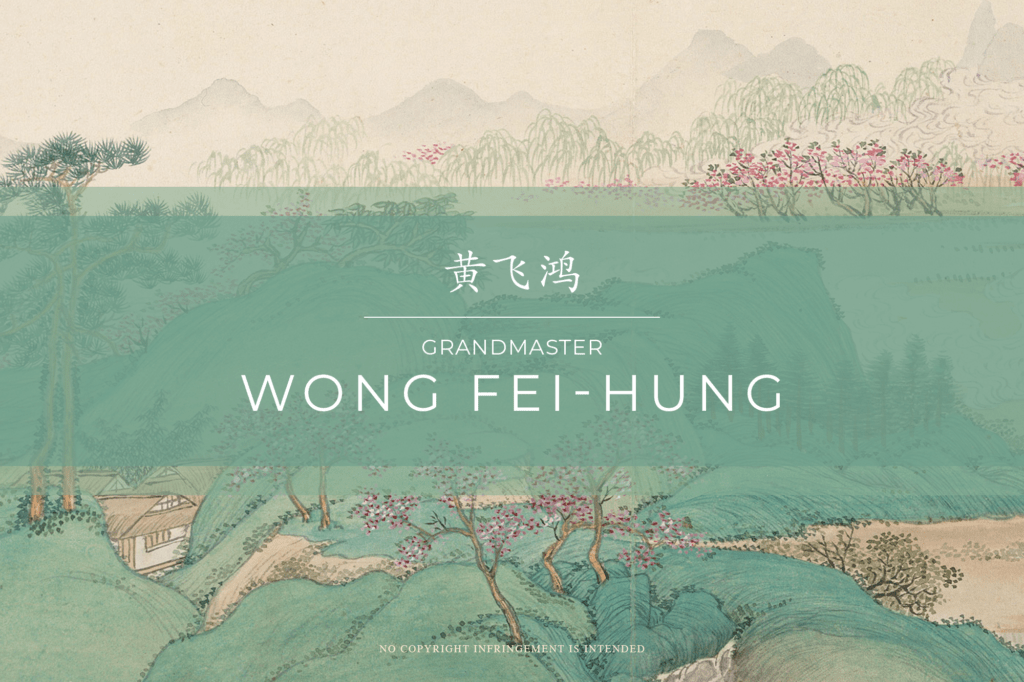
Today we will be discussing the incredible life of 黄飞鸿 Wong Fei-hung. He is considered one of the forefathers of modern day martial arts, a master bone setter and a folk hero.
黄飞鸿 Wong Fei-hung was born near Foshan (Bruce Lee’s ancestral home) in 1847 and was given the name 锡祥 Sek-cheung by his parents. He lived during late Qing Dynasty (1636-1912).
His father, 黃麒英 Wong Kei-ying, was a master martial artist and a famed herbalist. He taught his son everything he knew. It was not hard as 黄飞鸿 Wong Fei-hung was a quick learner and an amiable kid, who quickly made many friends in both the martial and medical worlds which exposed him to vast amounts of information and ancient wisdom.
黄飞鸿 Wong Fei-hung began practicing martial arts as early as 5 years old under his father’s supervision who was one of the Ten Tigers of Canton.
广东十虎 The Ten Tigers of Canton were ten Chinese martial artists known as the best fighters in southern China during late Qing Dynasty. Only the best of the best had this famed title bestowed upon them. To this day the Ten Tigers of Canton are considered to be folk legends and stories about their lives and accomplishments are passed down from generation to generation. Many believe that the Ten Tigers traced their lineage all the way back to the Buddhist fighters of the Southern Shaolin monastery.
When growing up 黄飞鸿 Wong Fei-hung together with his father traveled around and participated in martial performances held on the streets. As was customary then, and still is today, many master martial artists are also highly skilled and experienced physicians. Both 黄飞鸿 Wong Fei-hung and his father were no exception. They sold herbs after the performances and practiced bone setting.
跌打Dit Da is a bone setting procedure practiced by martial artists. It is an ancient practice dating back at least 4,000 years and the expertise is usually transferred from master to disciple within the walls of martial temples in China.
跌打Dit Da is more than just traditional bone setting to treat physical injuries, it also deals with bones, muscles, tendons, ligaments, arteries and Qi meridians by stimulating the body’s natural healing processes for a quicker and more complete recovery. 跌打 Dit Da also incorporates several modalities ranging from massage, acupressure, Qigong to herbal applications such as compresses and infusions.
After years of selling herbs and practicing bone setting on the road, 黃麒英 Wong Kei-ying and 黄飞鸿 Wong Fei-hung had gained popularity and saved enough to establish a successful martial arts school and clinic they called 寶芝林Po Chi Lam. Both father and son were talented and highly skilled acupuncturists, bone setters, and herbalists.
黃麒英Wong Kei-ying and 黄飞鸿 Wong Fei-hung were known for always standing up for the weak and extending a helping hand to the poor. They never turned a patient away, even those who couldn’t afford a treatment. Certain criminal gangs and corrupt government elements who dared to oppress the weak and poor had to face the wrath and exceptional martial skill of the Wong family.
Chinese folklore praises 黄飞鸿 Wong Fei-hung for his heroic efforts to encourage pride and dignity in the community at a time when national morale was affected by strong foreign oppression.
黄飞鸿 Wong Fei-hung’s exceptional martial and medical skills got him a position in the army and local militia fighting colonialism both as a physician and martial arts teacher.
In fact, according to legend 黄飞鸿 Wong Fei-hung was so accomplished with the Chinese Staff and Southern Tiger Fork that he once single-handedly defeated a group of 30 gangsters with just a staff.
黄飞鸿 Wong Fei-hung is also greatly famed for his “no shadow” kick technique and Lion Dancing mastery. Many still call him the King of Lions. His “no shadow” kick was so fast and flawless that it literally did not leave a shadow. And if that is not enough, 黄飞鸿 Wong Fei-hung is presumed not to have lost a single battle in his life.
No photographs of 黄飞鸿Wong Fei-hung that can be found in the world as he believed that taking one’s photograph shortens his or her life span.
黄飞鸿Wong Fei-hung had many students, many of whom became revolutionaries and spread his teachings across China and later the entire world. His wife 莫桂兰 Mok Kwai-lan, and their two sons moved to Hong Kong and established successful martial arts schools and clinics there after 黄飞鸿 Wong Fei-hung’s death in 1925.
When his famed 寶芝林 Po Chi Lam clinic and martial arts school was destroyed by the government during an attempt to suppress a local uprising in 1924, 黄飞鸿 Wong Fei-hung was deeply saddened. Heartbroken he fell into depression as a result and became ill eventually unable to recover.
黄飞鸿 Wong Fei-hung has been immortalized in more than 100 films and television series. His character is even featured in a video game and a theme song. He remains the most prolific hero of Kung Fu movies and the Wong Fei-hung series holds the Guinness Book of World Records for the longest running movie series.
In memory of his greatness and colossal contribution to the world, the Wong Fei-hung Lion Dance Martial Arts Museum was established in黄飞鸿 Wong Fei-hung’s hometown of Foshan in 1966. In 2000 a Wong Fei-hung Memorial Hall was built in his honor in the same town.